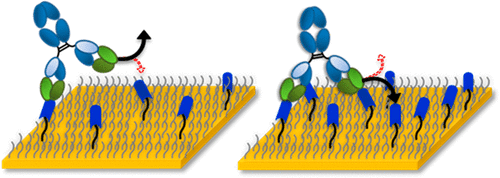当前位置:
X-MOL 学术
›
Anal. Chem.
›
论文详情
Our official English website, www.x-mol.net, welcomes your
feedback! (Note: you will need to create a separate account there.)
Impact of Antigen Density on Recognition by Monoclonal Antibodies.
Analytical Chemistry ( IF 6.7 ) Pub Date : 2020-03-26 , DOI: 10.1021/acs.analchem.0c00092 Laure Bar 1 , Jérôme Dejeu 1 , Rémy Lartia 1 , Fouzia Bano 2 , Ralf P Richter 2 , Liliane Coche-Guérente 1 , Didier Boturyn 1
Analytical Chemistry ( IF 6.7 ) Pub Date : 2020-03-26 , DOI: 10.1021/acs.analchem.0c00092 Laure Bar 1 , Jérôme Dejeu 1 , Rémy Lartia 1 , Fouzia Bano 2 , Ralf P Richter 2 , Liliane Coche-Guérente 1 , Didier Boturyn 1
Affiliation

|
Understanding antigen–antibody interactions is important to many emerging medical and bioanalytical applications. In particular, the levels of antigen expression at the cell surface may determine antibody-mediated cell death. This parameter has a clear effect on outcome in patients undergoing immunotherapy. In this context, CD20 which is expressed in the membrane of B cells has received significant attention as target for immunotherapy of leukemia and lymphoma using the monoclonal antibody rituximab. To systematically study the impact of CD20 density on antibody recognition, we designed self-assembled monolayers that display tunable CD20 epitope densities. For this purpose, we developed in situ click chemistry to functionalize SPR sensor chips. We find that the rituximab binding affinity depends sensitively and nonmonotonously on CD20 surface density. Strongest binding, with an equilibrium dissociation constant (KD = 32 nM) close to values previously reported from in vitro analysis with B cells (apparent KD between 5 and 19 nM), was obtained for an average inter-antigen spacing of 2 nm. This distance is required for improving rituximab recognition, and in agreement with the known requirement of CD20 to form clusters to elicit a biological response. More generally, this study offers an interesting outlook in the understanding of the necessity of epitope clusters for effective mAb recognition.
中文翻译:

抗原密度对单克隆抗体识别的影响。
了解抗原-抗体的相互作用对于许多新兴的医学和生物分析应用很重要。特别地,在细胞表面的抗原表达水平可以决定抗体介导的细胞死亡。该参数对接受免疫治疗的患者的结局有明显影响。在这种情况下,在B细胞膜中表达的CD20作为使用单克隆抗体利妥昔单抗的白血病和淋巴瘤免疫疗法的靶标受到了广泛的关注。为了系统地研究CD20密度对抗体识别的影响,我们设计了显示可调节CD20表位密度的自组装单分子膜。为此,我们就地开发了单击化学以功能化SPR传感器芯片。我们发现利妥昔单抗结合亲和力敏感地和非单调地取决于CD20表面密度。对于平均抗原间隔为2 nm,获得了最强的结合力,其平衡解离常数(K D = 32 nM)接近于先前用B细胞进行体外分析所报道的值(表观K D在5到19 nM之间)。 。该距离是改善利妥昔单抗识别所必需的,并且与CD20形成簇以引发生物学反应的已知要求一致。更广泛地讲,这项研究为了解有效的mAb识别的表位簇的必要性提供了有趣的前景。
更新日期:2020-03-27
中文翻译:

抗原密度对单克隆抗体识别的影响。
了解抗原-抗体的相互作用对于许多新兴的医学和生物分析应用很重要。特别地,在细胞表面的抗原表达水平可以决定抗体介导的细胞死亡。该参数对接受免疫治疗的患者的结局有明显影响。在这种情况下,在B细胞膜中表达的CD20作为使用单克隆抗体利妥昔单抗的白血病和淋巴瘤免疫疗法的靶标受到了广泛的关注。为了系统地研究CD20密度对抗体识别的影响,我们设计了显示可调节CD20表位密度的自组装单分子膜。为此,我们就地开发了单击化学以功能化SPR传感器芯片。我们发现利妥昔单抗结合亲和力敏感地和非单调地取决于CD20表面密度。对于平均抗原间隔为2 nm,获得了最强的结合力,其平衡解离常数(K D = 32 nM)接近于先前用B细胞进行体外分析所报道的值(表观K D在5到19 nM之间)。 。该距离是改善利妥昔单抗识别所必需的,并且与CD20形成簇以引发生物学反应的已知要求一致。更广泛地讲,这项研究为了解有效的mAb识别的表位簇的必要性提供了有趣的前景。











































 京公网安备 11010802027423号
京公网安备 11010802027423号